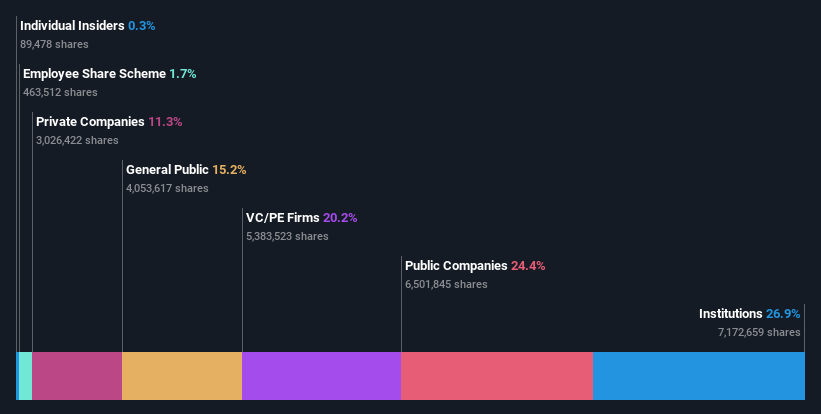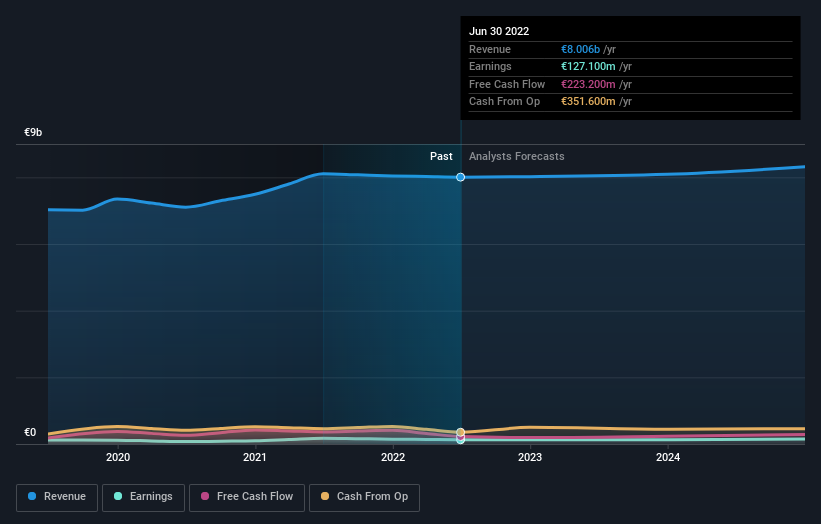- France
- /
- Specialty Stores
- /
- ENXTPA:FNAC
Institutional investors may adopt severe steps after Fnac Darty SA's (EPA:FNAC) latest 8.0% drop adds to a year losses

A look at the shareholders of Fnac Darty SA (EPA:FNAC) can tell us which group is most powerful. And the group that holds the biggest piece of the pie are institutions with 27% ownership. Put another way, the group faces the maximum upside potential (or downside risk).
And institutional investors saw their holdings value drop by 8.0% last week. The recent loss, which adds to a one-year loss of 46% for stockholders, may not sit well with this group of investors. Also referred to as "smart money", institutions have a lot of sway over how a stock's price moves. As a result, if the downtrend continues, institutions may face pressures to sell Fnac Darty, which might have negative implications on individual investors.
Let's delve deeper into each type of owner of Fnac Darty, beginning with the chart below.
Before we look at the ownership breakdown, you might like to know that our analysis indicates that FNAC is potentially undervalued!

What Does The Institutional Ownership Tell Us About Fnac Darty?
Many institutions measure their performance against an index that approximates the local market. So they usually pay more attention to companies that are included in major indices.
As you can see, institutional investors have a fair amount of stake in Fnac Darty. This can indicate that the company has a certain degree of credibility in the investment community. However, it is best to be wary of relying on the supposed validation that comes with institutional investors. They too, get it wrong sometimes. If multiple institutions change their view on a stock at the same time, you could see the share price drop fast. It's therefore worth looking at Fnac Darty's earnings history below. Of course, the future is what really matters.

Fnac Darty is not owned by hedge funds. Looking at our data, we can see that the largest shareholder is Ceconomy AG with 24% of shares outstanding. In comparison, the second and third largest shareholders hold about 20% and 11% of the stock.
To make our study more interesting, we found that the top 3 shareholders have a majority ownership in the company, meaning that they are powerful enough to influence the decisions of the company.
While it makes sense to study institutional ownership data for a company, it also makes sense to study analyst sentiments to know which way the wind is blowing. There are plenty of analysts covering the stock, so it might be worth seeing what they are forecasting, too.
Insider Ownership Of Fnac Darty
While the precise definition of an insider can be subjective, almost everyone considers board members to be insiders. Company management run the business, but the CEO will answer to the board, even if he or she is a member of it.
I generally consider insider ownership to be a good thing. However, on some occasions it makes it more difficult for other shareholders to hold the board accountable for decisions.
Our information suggests that Fnac Darty SA insiders own under 1% of the company. However, it's possible that insiders might have an indirect interest through a more complex structure. It has a market capitalization of just €759m, and the board has only €2.5m worth of shares in their own names. Many tend to prefer to see a board with bigger shareholdings. A good next step might be to take a look at this free summary of insider buying and selling.
General Public Ownership
The general public-- including retail investors -- own 15% stake in the company, and hence can't easily be ignored. While this size of ownership may not be enough to sway a policy decision in their favour, they can still make a collective impact on company policies.
Private Equity Ownership
With an ownership of 20%, private equity firms are in a position to play a role in shaping corporate strategy with a focus on value creation. Some investors might be encouraged by this, since private equity are sometimes able to encourage strategies that help the market see the value in the company. Alternatively, those holders might be exiting the investment after taking it public.
Private Company Ownership
It seems that Private Companies own 11%, of the Fnac Darty stock. Private companies may be related parties. Sometimes insiders have an interest in a public company through a holding in a private company, rather than in their own capacity as an individual. While it's hard to draw any broad stroke conclusions, it is worth noting as an area for further research.
Public Company Ownership
We can see that public companies hold 24% of the Fnac Darty shares on issue. This may be a strategic interest and the two companies may have related business interests. It could be that they have de-merged. This holding is probably worth investigating further.
Next Steps:
It's always worth thinking about the different groups who own shares in a company. But to understand Fnac Darty better, we need to consider many other factors. Take risks for example - Fnac Darty has 1 warning sign we think you should be aware of.
But ultimately it is the future, not the past, that will determine how well the owners of this business will do. Therefore we think it advisable to take a look at this free report showing whether analysts are predicting a brighter future.
NB: Figures in this article are calculated using data from the last twelve months, which refer to the 12-month period ending on the last date of the month the financial statement is dated. This may not be consistent with full year annual report figures.
New: AI Stock Screener & Alerts
Our new AI Stock Screener scans the market every day to uncover opportunities.
• Dividend Powerhouses (3%+ Yield)
• Undervalued Small Caps with Insider Buying
• High growth Tech and AI Companies
Or build your own from over 50 metrics.
Have feedback on this article? Concerned about the content? Get in touch with us directly. Alternatively, email editorial-team (at) simplywallst.com.
This article by Simply Wall St is general in nature. We provide commentary based on historical data and analyst forecasts only using an unbiased methodology and our articles are not intended to be financial advice. It does not constitute a recommendation to buy or sell any stock, and does not take account of your objectives, or your financial situation. We aim to bring you long-term focused analysis driven by fundamental data. Note that our analysis may not factor in the latest price-sensitive company announcements or qualitative material. Simply Wall St has no position in any stocks mentioned.
About ENXTPA:FNAC
Fnac Darty
Engages in the retail of entertainment and leisure products, consumer electronics, and domestic appliances in France, Switzerland, Belgium, Luxembourg, and the Iberian Peninsula.
Adequate balance sheet and fair value.


